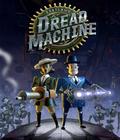Twin-stick shooters have covered almost every imaginable angle. The mechanic has been seen in roguelikes and arcade-style score attacks. You've seen it applied to violent game shows and missions to defeat dictators. It's been applied to bullet-hell shooters in the air and on the ground, and it's been a favorite of those who like a co-op experience. How would you make your new twin-stick shooter stand out from the crowd? If you're the developers of Bartlow's Dread Machine, you do something bold and put your game on rails.
Bartlow's Dread Machine is set at the dawn of the 20th century, and it casts you in the role of a newly minted Secret Service agent. While on duty in New York City to ensure that President Theodore Roosevelt's visit goes smoothly, you learn that he is kidnapped by a group of Anachro-Satanists. With the local branch of agents wiped out, you become the last hope to rescue the President and put the Anachro-Satanists to justice.
The old-timey story feels quaint due to the presence of period-appropriate dialogue and excellent-sounding music, but the highlight is in the premise that you're actually playing on an old mechanical arcade machine that runs on gears rather than circuit boards and microchips. Pieces of the level come up from underneath as metal tiles flip over to reveal the level parts. Backgrounds scroll by on rolled paper, and elements like a sun or vehicles move around via mechanical arms. Players can see the moving gears that power the arcade at the bottom of the screen, and actual sparks fly when enemies are hit and your character deteriorates when enough damage is taken.
The premise has an effect on the movement in Bartlow's Dread Machine. Instead of freely roaming around in a 3D space as in most twin-stick shooters, you're restricted to moving around on preset rails. The movement restrictions can be jarring, especially since there are a few paths that annoyingly lead to dead ends, but they also present a few opportunities for strategy. For example, you can lure enemies into one pathway so you can spend more time mowing them down instead of dodging them. It also means rerouting a few times, since some pick-ups are only accessible in certain spots, but checkpoints are thankfully accessible anywhere as long as you pass by them.
The game is presented from a 2.5D viewpoint and acts like a beat-'em-up since you'll reach certain spots and have to wait for enemies to be vanquished before you can move on. You can perform a spin move to parry incoming shots, but you can't target where the bullets go, so there's no opportunity to use the bullet to your advantage. Most defeated enemies drop cash, which you can use to buy guns as secondary weapons (shotgun, dual revolvers, laser rifles, etc.) to go with the default rifle and handgun. The cash can also be used to buy clothing that provides benefits, such as more health or the ability to take on more melee damage. You can also buy accessories that replenish your health without stopping at another outpost.
The campaign goes through six worlds, each split up into three stages. As expected, the worlds vary greatly from the city of San Francisco to the Great Plains. A few stages require using guns to hit switches or lining up different environmental elements to perform trick shots to knock out the opposition. Other stages have you fighting in vehicles like old cars, and a few other stages change the viewpoint of the action, such as lowering the camera so the game emulates Wild Guns or elevating it so that it resembles Smash TV. The enemy roster also changes between levels, where you might go from brainwashed Secret Service agents in one level to Cthulhu-type bosses and undead Confederate Army officers somewhere else. It's all absurd in an enjoyable way, especially since you can obtain new characters with starting weapons, all of whom you can swap to between levels. It also helps that the game can be played in co-op mode, but online play is only available if you're willing to use Steam Remote Play.
The whole thing is straightforward, and the campaign is meaty enough that you'll spend quite a bit of time in shootouts before reaching the end. There might be a few annoyances. Although the graphics look great, the similar color schemes between the environment and characters can sometimes make it difficult to keep track of where you are. That becomes more evident when the camera switches from the 2.5D view to the top-down view, and the lack of a break in the action along with the similar color schemes can lead to you taking a few hits before realizing what's going on. The cash drops are constant, but the payouts are low, especially when you see the expensive items. If you want a decent arsenal, prepare to do some grinding by replaying old levels. Be prepared to drop the difficulty level if you haven't armed yourself with the best gear because the difficulty level shoots up in the latter half of the game.
Bartlow's Dread Machine is a fun time if you can overcome the quirks. The old-time setting works well in delivering some charm, and the shooting is solid. The idea of using rails for movement quickly becomes a novel way to play, and the variety keeps things fresh. Bartlow's Dread Machine is an enjoyable ride if you're a fan of the genre, and it's well worth checking out.
Score: 7.5/10
More articles about Bartlow's Dread Machine













 Bartlow's Dread Machine is an arcade shooter about a haunted old timey arcade cabinet where you play as tin secret agents trying to rescue a kidnapped Teddy Roosevelt.
Bartlow's Dread Machine is an arcade shooter about a haunted old timey arcade cabinet where you play as tin secret agents trying to rescue a kidnapped Teddy Roosevelt.









